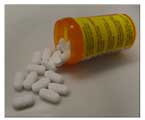Why This Is Important
In a pandemic, health care services may be overwhelmed, access to medication or therapy may be limited, and regular utility services such as water and electricity may be interrupted.
People with chronic medical problems will need to take the initiative to be responsible for their own health, and work with doctors and therapists to prepare and protect themselves.
Access to Medication
 Many medications are made overseas and may be in short supply during a pandemic. Important
Many medications are made overseas and may be in short supply during a pandemic. Important – verify NOW if your medications are made overseas. If the supply chain is broken, medication availability is very uncertain. You may be stuck at home and unable to re-supply. You may lose your job, lose your health insurance, not be able to pay your insurance premium, or not be able to afford your medications. Many people can receive prescription medication by mail, but you must not count on this service being available in a pandemic.
To take responsibility for your own health and increase your overall resiliency,
many planners advise people to try to stock up on at least a month or more of necessary prescription medications. Work with your doctor, pharmacist, or patient advocacy group to find the answers to these questions: 
- Which medications for my condition may be in short supply during a pandemic?
- How can patients with my condition successfully and economically stockpile a month or more of some drugs? Some people pay out of pocket for an extra supply, or they renew their prescription as early as possible to get additional days of medication each month. Over a year this can be an extra month’s supply.

- What will happen to my condition if I suddenly stop taking necessary medication if I run out and cannot re-supply? Are there any lifestyle or diet changes I could make now, or in an emergency, to reduce my need for medication, even if only on a temporary basis? Could I take lower doses of medication, even on a temporary basis, to make my supply last longer? What other options are there?

- If drugs need refrigeration, what is a good strategy for maintaining a supply during an extended power outage? For example, are generators or coolers available? Are there other medication storage issues to be dealt with, and how are patients handling them?
Continuing Needed Therapy

At the
pandemicflu.gov website, the US government warns that medical care for people with chronic illness could be disrupted and advises you to talk to your healthcare provider to ensure adequate access to your medications. Print out this
guide for individuals and families, and take it to your healthcare provider.
Follow-up by contacting your healthcare provider or patient advocacy group to work on the following questions:
- Which specific treatments for my condition may be affected by a pandemic?
- How are health care providers trying to work on these situations?
Emergency or Pandemic Planning Guides
 Citizens with chronic medical conditions need to take action now
Citizens with chronic medical conditions need to take action now to protect themselves during any extended emergency. Check with national associations for your medical condition. Example links to guides from patient advocacy groups dealing with issues of emergency preparedness are:
Kidney Conditions (dialysis): "What You Need to Know About Emergency Preparedness for Individuals with Kidney Disease"Pharmacies and Prescription Medication: "A Pharmacists Guide to Pandemic Preparedness"